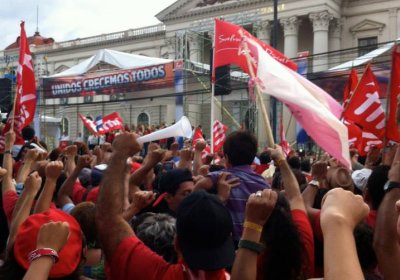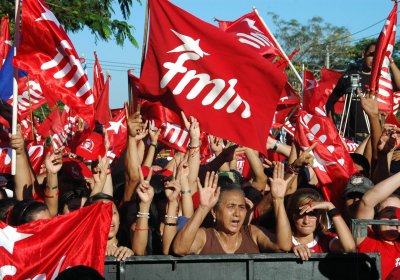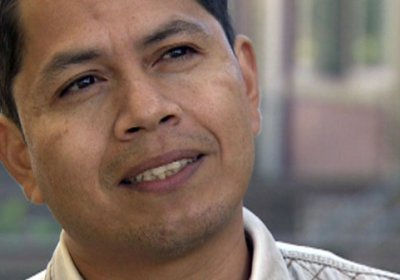El Salvador joined four other Latin American countries in recalling its ambassador from Tel Aviv in protest against Israel’s bloody attack on the Gaza Strip, International Business Times said on July 30.
Brazil, Chile, Ecuador and Peru have all recalled their diplomatic representatives to Israel.
El Salvador
Marta Harnecker, a veteran Chilean-born author and politcal analyst who as an advisor to the government of late Venezuelan president Hugo Chavez between 2004-11, spoke to Jose P. Gurrero about the new left-wing government in El Salvador.
Venezuela: Social programs expanded in poorest communities
The Venezuelan government has initiated its policy of expanding social programs in the country’s most deprived areas in a bid to eradicate extreme poverty, Venezuelanalysis.com said on June 30.
The initiative, called “Red Sundays”, involves teams of social program workers visiting poorer communities every Sunday to diagnose which households are deprived of certain basic needs and which social programs are required to attend to these needs.
“On June 1, 2014, Salvador Sanchez Ceren, historic leader of the Frente Farabundo Martí para la Liberacion Nacional (FMLN), was inaugurated as President of El Salvador,” CISPES.org said on June 3.
El Salvador's Legislative Assembly approved the Social Development and Protection Law on April 3. The law was presented by President Mauricio Funes last year to ensure the groundbreaking social services initiated by his administration continued.
These programs are designed to address the needs of historically abandoned and excluded sectors. The law mandates a “legal framework for human development, protection and social inclusion that promotes, protects and guarantees the fulfillment of people’s rights”.
Salvador Sanchez Ceren, the presidential candidate of El Salvador’s left-wing Farabundo Marti National Liberation Front (FMLN) party, was declared the winner of the country’s run-off presidential election on March 12.
Ceren won 50.11% of total votes. The Supreme Electoral Tribunal (TSE) declared the victory after voting sheets were cross-referenced with preliminary results from election day.
Venezuelan President Nicolas Maduro ebulliently congratulated president-elect Salvador Sanchez Ceren of El Salvador’s FMLN party, who was declared winner on March 10 by just 6000 votes after a tense electoral race. The left-wing Farabundo Marti National Liberation Front (FMLN) resisted a string of US backed governments throughout the 1980s during El Salvador’s devastating civil war. Maduro wrote on Twitter: “Sanchez Ceren is a legendary leader for democracy and human rights in El Salvador. The results mean another triumph for left-wing Latin America, thank you for waking up history.”
Dancing to the festive sounds of cumbia and ska music, thousands of supporters of the left-wing Farabundo Marti National Liberation Front (FMLN) celebrated the expected victory of their candidate, Salvador Sanchez Ceren, as the vote counts in El Salvador’s presidential run-off election poured in on the night of March 9.
On a hot and breezeless day at the end of January, representatives from 83 unions across El Salvador gathered in the Casa Sindical (a shared union hall) in San Salvador to greet a delegation of international election observers.
We had come to ensure that the presidential election would be free of fraud, violence and intimidation.
The images and names of their fallen comrades loomed on the walls behind them in black paint. Febe Elizabeth Velasquez. Juan Chacon. Ten unionists were martyred in a 1989 bombing by right-wing death squads, targeted because they were union leaders.
With more than 99% of polling places reporting, the candidate for the left-wing Farabundo Marti National Liberation Front (FMLN), Salvador Sanchez Ceren, easily won the first round of El Salvador’s presidential elections on February 2.
Sanchez Ceren scored nearly 49% of the vote, more than ten-points higher than Norman Quijano of the Nationalist Republican Alliance (ARENA), who placed second with 39%. Former president Tony Saca garnered just over 11% of the vote. The FMLN and ARENA will head to a run-off on March 9.
“The Canadian government is forcing me to divorce my wife.” With these words, Salvadoran refugee and long-time Canadian resident Jose Figueroa sums up the devastatingly cruel situation he and his family find themselves in.
The human rights situation in El Salvador from the 1970s to the '90s was dire. A vicious right-wing military dictatorship, supported financially and morally by the United States government. Widespread murder and torture of innocent people, often through the use of death squads, which were trained in the US.
United States President Barack Obama’s visit to El Salvador on March 22 became a focal point for protests.
Protests were organised that day by Central American social movement organisations and their North American allies outraged by US trade policy and military meddling in the region.
Local environmental and community organisations joined with allies such as US-El Salvador Sister Cities and Committees in Solidarity with the People of El Salvador to mobilise students and workers for rallies in the US and El Salvador on March 22.
- Previous page
- Page 3
- Next page





